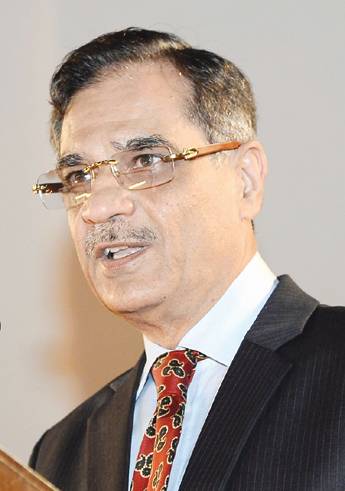ISLAMABAD - Chief Justice of Pakistan Mian Saqib Nisar said Monday that if the foreign investors from the world be given assurance that their disputes will be dealt with quickly and justly, Pakistan will become an attractive destination for foreign direct investment (FDI).
“If foreign investors in Pakistan, not only from China but elsewhere in the world, can be assured that any disputes arising out of trade and commercial contracts will be dealt with in a quick and just manner, without endless procedural hurdles and frustrating delays then it will make Pakistan more attractive destination for FDI,” said chief justice.
He said this while addressing the faculty members and students at East China University Shanghai. Reiterating the importance of China-Pakistan Economic Corridor (CPEC), chief justice said the superior judiciary in Pakistan is conscious of its role in this regard.
“Therefore, the NJPMC (National Judicial Policy Making Committee) has issued directions to civil courts not to issue ex-parte stay orders in respect of CPEC-related projects,” he said as quoted in a press statement of top court’s spokesperson.
Such directions of not to issue ex-parte stay orders will improve the confidence level of foreign investors on Pakistan’s judicial system and will give a sense of protection, comfort and peace of mind whilst investing in Pakistan. Chief justice also floated an idea of special forum like IFC Dubai to look after the disputes pertaining to CPEC.
“Moreover, with respect to CPEC investment, there is a requirement of uniformity in laws, processes and mechanisms and there is a need of a forum like IFC Dubai to look after foreign direct investment and that special courts be designated for hearing CPEC-related disputes.”
At the outset, chief justice told the addressees that his visit to Republic of China is an attempt to further strengthen the cordial relations between citizens of both countries and their government by sharing experiences and capabilities in different walks of life especially in the justice sector.
“During my visit to the People’s Republic of China, I have tried to evaluate the potential venues of judicial cooperation between our two countries with the very specific purpose of dealing with any likely legal challenges arising out of the Pak-China economic and commercial ties,” he said.
Chief justice stressed upon the need to closely work for developing mechanism at states level and if necessary on the judicial level too.
“We believe that the judiciaries of the region, especially with regard to CPEC Pak-China, need to work closely for developing mechanisms such as smart courts and information centers so that both the countries can progress hand in hand. The sharing of legal ideas and the use of information technology by our two countries will be materially helpful for the judicial systems of both the countries.”
Outlining the Constitution of Pakistan and independence of judiciary, the chief justice in his address said that superior courts in Pakistan provide checks and balances to the executive power of the state by means of judicial review of executive actions.
“It is settled law in Pakistan that the discretion and powers vested with the state functionaries are not unfettered and are to be exercised judicially and not arbitrarily or whimsically and should be based on sound principles of justice, equity, fairness and in accordance with the spirit of the provisions in which such powers are given.”
He further said, “It is important that our trading partners should know that if and when any dispute arises with respect to any commercial transactions/dealings it will be dealt with fairly by the courts in Pakistan and even where the other party is the government of Pakistan the Pakistani courts will hold their actions to the highest standards possible. “The judiciary in Pakistan is truly independent and we give judgments without fear or favour,” said the chief justice.
“Where there are violations of the constitution and statutes, arbitrary and capricious acts or omissions, malfunctioning, corruption, nepotism, failure to perform etc the judiciary is obliged to play its part for the sake of the polity,” he said adding as states develop and deliver a better quality of life to their citizens and ensure provision of their fundamental rights to all citizens, role of the judiciary becomes more restricted to the extent of interpretation of laws and adjudicator of disputes.
He said that being torch-bearer of the rule of law in Pakistan, the superior judiciary is playing a vigilant role for fair dispensation of justice. The judiciary has proven itself as an ultimate protector of fundamental rights of the citizens of Pakistan.
In his speech at the varsity in Shanghai, the chief justice said the apex court requires the executive to accomplish its duties with the greatest capacity and honesty and faithfulness in accordance with the constitution, law and rules of assembly, to uphold the ‘sovereignty, integrity, solidarity, well-being and prosperity of Pakistan.’
The chief justice said that the top court has proven itself as the ultimate custodian of the fundamental rights of the citizens of Pakistan, especially, by exercising its suo motu jurisdiction for matters involving public interest litigation (PIL).
“The Supreme Court of Pakistan has succeeded in enhancing its credibility and earned the trust of the people by providing speedy justice to deprived classes by exercising its authority with respect to public interest litigation,” he said.
The CJP said that top court has presently taken suo motu notice of matters involving legal and medical education and various environmental issues such as depletion of scarce water resources by the cement industry, the conditions prevailing in government hospitals.






